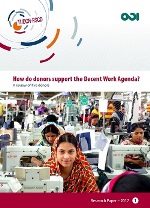How do donors support the Decent Work Agenda?
Published on Fri, 2017-03-31 16:13
A new TUDCN study by the Overseas Development Institute reviews the contribution of five donor countries to providing decent work in developing countries. Entitled How do donors support the Decent Work Agenda? - A review of five donors, this study assesses the various forms of support provided through Official Development Assistance by France, Japan, Sweden, the United Kingdom and the United States. Looking ahead, the study also includes recommendations on how to better track and evaluate these contributions in the future. The push to achieve decent work is gaining increased momentum within global development efforts. The 2030 Agenda illustrates this well by its recognition of the centrality of decent work in achieving sustainable development. While decent work constitutes a Sustainable Development Goal in its own right, the 2030 Agenda further highlights how the achievement of decent work underpins progress in many other key areas. Decent Work Agenda The Decent Work Agenda is the framework for ensuring decent work. The four pillars of the Decent Work Agenda, as defined by the International Labour Organisation, are employment creation, rights at work, social protection and social dialogue. An important body of evidence underpins the combined role of these four pillars in creating and sustainably maintaining decent work. Donor support Many donor countries recognise the importance of employment within the development process and include it among their development priorities. Employment creation featured among the development cooperation priorities of all five donor countries surveyed. Often however, little to no focus is given to the quality of the employment created. Of the three other pillars of the Decent Work Agenda, this study reveals that donors tend to under prioritise social dialogue and, to a lesser extent, social protection. Recommendations While employment creation has been given a lot of attention, that received by the other pillars of the Decent Work Agenda has been considerably less. In order to incentivise a more balanced approach and ensure greater policy coherence, this study recommends that donors place more emphasis on other pillars of the Decent Work Agenda, in particular on social dialogue and social protection. The first step to guaranteeing a more comprehensive approach to decent work creation is to measure contributions to all four of its components individually. The means to do this exist in the OECD-DAC Creditor Reporting System (CRS). The CRS should allow for better tracking of resource flows to the different pillars of Decent Work, either through pillar specific CRS codes or through a "Decent Work Marker" (similar to the Gender Equality Marker, which already exists). The full study is available here. Tags: |
SUSCRIBE TO OUR NEWSLETTER



